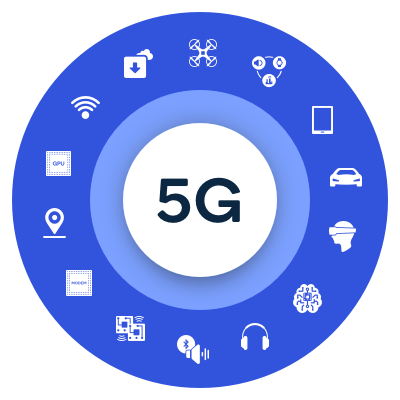5G Expansion
The process of setting up and growing the infrastructure needed to support 5G networks globally is known as 5G expansion. It entails expanding coverage, enhancing network performance, and opening up the technology to more users and geographical areas. 5G, the fifth generation of mobile wireless technology, promises improved connectivity, reduced latency, and quicker speeds.
Worldwide Rollout: Although at differing rates, 5G networks are expanding throughout the world. While other regions are coming up, some nations, such as the United States and South Korea, have been at the forefront of 5G implementation. Expanding fiber-optic networks, putting tiny cells in cities, and constructing more cell towers are important milestones.
Faster Speeds: 5G gives mobile consumers smoother experiences by offering download speeds up to 100 times faster than 4G. This improvement in speed is critical for applications that require high bandwidth, such as 4K/8K video streaming, cloud gaming, and large-scale data transmission.
Reduced Latency: 5G’s reduced latency, or quicker reaction time between sending and receiving data, is one of its biggest benefits. 5G makes real-time communication possible with latencies as low as 1 millisecond, which makes it perfect for crucial applications like remote surgery, driverless cars, and augmented/virtual reality (AR/VR).
Enhanced Connectivity and Capacity: 5G is built to support a far higher volume of connected devices than earlier iterations. This is essential as the Internet of Things (IoT) continues to expand the number of linked devices. The smooth integration of millions of smart gadgets, sensors, and appliances will help cities, factories, and homes.
Network Slicing: 5G makes it possible for operators to design virtual networks that are customized to meet certain requirements. For sectors like healthcare, transportation, and smart cities, where various applications demand varying performance levels, this aids in offering more effective and tailored services.
New Technological Possibilities: As 5G technology develops, new developments like connected factories, smart cities, remote job options, and next-generation entertainment experiences become possible. It also supports breakthroughs in artificial intelligence (AI) and machine learning, which rely on fast, reliable data transmission for real-time decision-making.
Difficulties with Expansion: Although 5G has a lot of potential, there are obstacles to overcome before it can be widely implemented. These include the necessity for suitable equipment, regulatory obstacles, and the high expense of infrastructure (e.g., constructing towers, installing fiber cables). The deployment has been slower in some nations because of things like complicated planning regulations or a lack of funding.
5G expansion is essentially the worldwide endeavor to modernize mobile networks in order to satisfy the increasing demand for speed, capacity, and low latency. It also opens up new avenues for economic growth and innovation across a wide range of industries.
Share this content:













